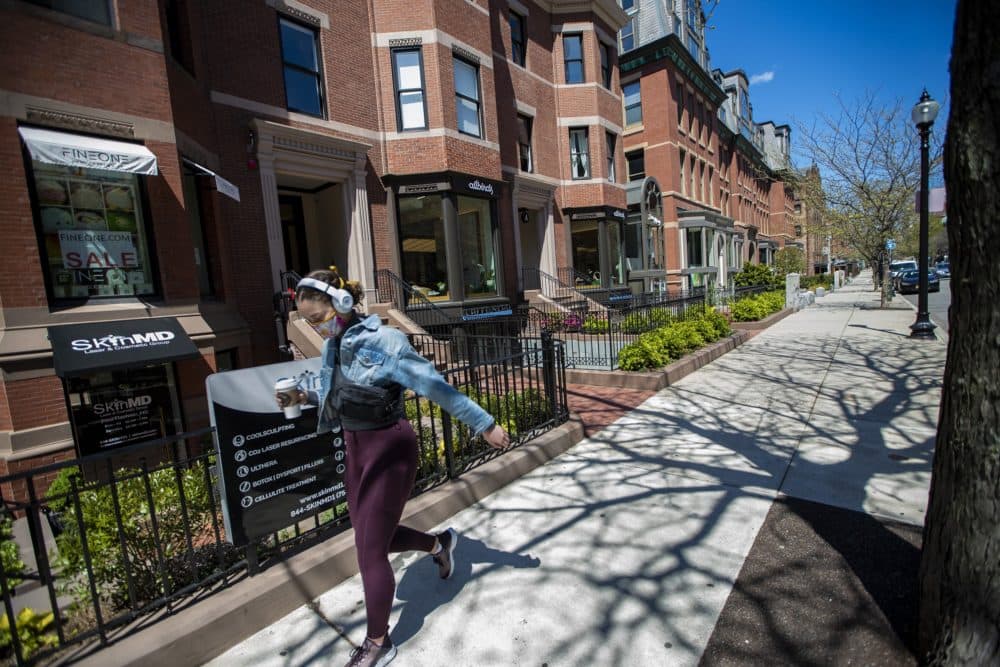Advertisement
Coronavirus Coverage
Gov. Baker Unveils Details On 4-Phase Plan To Reopen Mass.

Massachusetts is relaxing its stay-at-home advisory and will allow a range of businesses — including retailers, hair salons and office buildings outside Boston — to reopen in limited capacities next week, under a plan unveiled by Gov. Charlie Baker Monday.
Effective immediately, a new "safer at home" advisory softens some previous guidance for state residents, asking parents to "limit," but not completely avoid, children's play dates, for example. The advisory suggests leaving home only for work, shopping, health care, religious services and outdoor activities.
Parks, beaches and drive-in movie theaters are among the outdoor venues that have the state's blessing to reopen next week.
As expected, factories, construction sites and houses of worship are the first business locations to receive reopening green lights. The Baker administration had informed some municipal leaders of those plans over the weekend, and the Metropolitan Area Planning Council shared the details with member communities.
Next up, on May 25, are such businesses as laboratories, car washes, pet groomers and shops offering curbside pickup. Except in Boston, offices previously deemed non-essential can bring back 25% of workers. (Here's the state's list of what businesses are allowed to open and in which phase.)
The state's mask-wearing and 6-foot, physical distancing requirements remain in place.
Amid mounting anticipation of the plan's release, Baker had said not to expect a complete economic reopening but rather a gradual process that will unfold in four phases.
"Everyone has a responsibility to wash their hands, distance themselves from others, and be vigilant about symptoms, so that you can stay home — and you should stay home — if you feel sick," he said a State House news conference Monday. "How well everyone does these things will determine how well we move into later phases."
After issuing an emergency order that shuttered non-essential businesses in March, Baker extended the closures multiple times and abandoned the notion of a uniform expiration date when everyone could immediately go back to offices, malls, theaters and other public places.
Advertisement
"We'll continue to follow the data and the public health metrics to determine when phase one — start of reopening — begins and then when it's safe to move on to concurrent phases after that," Baker said last week.
Baker had indicated the first businesses to reopen will be the ones that can severely limit contact between employees and customers, and among employees themselves.
Dine-in restaurants are slated for the second reopening phase, while gyms and museums are in the third. The state has not set dates for the later phases.
The fourth and final phase, which state officials refer to as a "new normal," won't come until there is a coronavirus vaccine or, perhaps, an effective treatment for COVID-19, the disease caused by the virus.
One of the most promising potential vaccines is in development by the Cambridge biotechnology firm Moderna, which said Monday that its drug successfully produced virus-fighting antibodies in eight people during a phase-one clinical trial.
The sample size is too small to demonstrate broad effectiveness, and it is unclear whether the antibodies would yield coronavirus immunity. Nevertheless, the early result is heartening.
Moderna's vaccine candidate is officially on the FDA's "fast track," as of last week, meaning regulators will help bring the vaccine to market as soon as possible, if it proves safe and effective.
Moderna said last week that it is about to begin a phase-two clinical trial involving 600 people. Half will be under age 55, half will be over and, as usual, half of both groups will get a placebo, not the potential vaccine. Participants will receive two doses, four weeks apart, and then will be followed for a full year.
Moderna can start a phase-three trial before that year is over; the company is aiming for early summer. But the bottom line is that a vaccine probably won't be on the market until 2021, which is what Moderna has said from the outset.
The process is moving fast, by the standards of drug development, but little feels fast to the companies that have had to close and the more than 1 million Massachusetts workers who've lost jobs.
Jon Hurst, president of the Retailers Association of Massachusetts, worries local companies are falling behind their neighbors in nearby states. Under the state's new plan, many retailers cannot welcome customers back into stores until the second phase of reopening.
"All the other New England states will be open prior to Memorial Day weekend," Hurst said. "We believe we need to move with the other states."
Some state lawmakers agree with this view. But others on Beacon Hill contend Massachusetts may actually be moving too quickly.
"I know everyone wants to get back to work," said Rep. Christine Barber, a Somerville Democrat, "but we have to do so safely, so it doesn't end up bringing back a resurgence of the disease that we've seen in other places when things have reopened too quickly."
State officials have repeatedly warned they may reimpose restrictions, if coronavirus cases surge again.
"Collectively, we have flattened the curve and avoided the spike in cases that would have broken our health care system," Baker said Monday. "But if we don't keep up the fight, and don't do the things that we all know we have to do, and know we can do, we run the risk of creating a second spike in the fall."
Massachusetts on Sunday reported fewer than 100 people dead for the first time in more than a month. Reports of new fatalities have been falling steadily for a couple of weeks, and other key metrics are encouraging.
This article was originally published on May 17, 2020.

